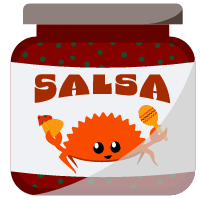20 releases
| 0.19.0 | Mar 10, 2025 |
|---|---|
| 0.17.0-pre.2 | Oct 6, 2021 |
| 0.17.0-pre.1 | May 29, 2021 |
| 0.16.0 | Oct 14, 2020 |
| 0.11.1 | Mar 27, 2019 |
#1010 in Procedural macros
76,278 downloads per month
Used in 69 crates
(via salsa)
92KB
2K
SLoC
salsa
A generic framework for on-demand, incrementalized computation.

Obligatory warning
Very much a WORK IN PROGRESS at this point.
Credits
This system is heavily inspired by adapton, glimmer, and rustc's query system. So credit goes to Eduard-Mihai Burtescu, Matthew Hammer, Yehuda Katz, and Michael Woerister.
Key idea
The key idea of salsa is that you define your program as a set of
queries. Every query is used like function K -> V that maps from
some key of type K to a value of type V. Queries come in two basic
varieties:
- Inputs: the base inputs to your system. You can change these whenever you like.
- Functions: pure functions (no side effects) that transform your inputs into other values. The results of queries are memoized to avoid recomputing them a lot. When you make changes to the inputs, we'll figure out (fairly intelligently) when we can re-use these memoized values and when we have to recompute them.
Want to learn more?
To learn more about Salsa, try one of the following:
- read the heavily commented examples;
- check out the Salsa book;
- watch one of our videos.
Getting in touch
The bulk of the discussion happens in the issues and pull requests, but we have a zulip chat as well.
Contributing
To create a release and publish to crates.io, follow the steps:
- Update the
versionfield in Cargo.toml. - Create a Git tag. The tag name must follow the format like "v*..".
- Push. GitHub Actions will publish the crate to crates.io automatically.
lib.rs:
This crate provides salsa's macros and attributes.
Dependencies
~295–750KB
~17K SLoC